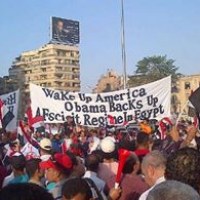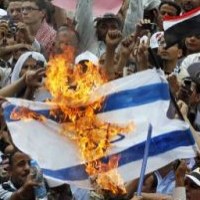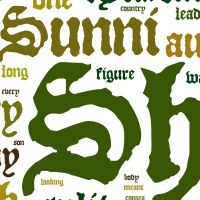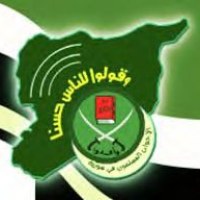![]()
Tue, April 05, 2011 | DebkaFile

Syrians living in Jordan shout slogans as they protest in solidarity with anti-government protesters in Syria, outside the Syrian embassy in Amman April 2, 2011. (REUTERS/Majed Jaber)
The Syrian Revolution 2011: First Protest Shooting in Damascus
A DEBKAfile Exclusive Report:
The Syrian uprising took a new turn Tuesday, April 5, when armed protesters opened fire for the first time on security forces from a well-laid ambush in a Damascus suburb. Two policemen were killed according to first reports. The fact that armed elements have taken over and are willing to use violence against Assad regime — and in the capital yet — marks a new and dangerous stage in the two-week long protest.
Syria’s banned opposition groups and Muslim Brotherhood, under the combined new banner of “The Syrian Revolution 2011,” earlier announed a fresh round of demonstrations against President Bashar Assad starting Tuesday, April 5, and lasting until next week, debkafile’s Middle East sources report.
Both sides of the conflict realize that the Assad regime is not yet at the tipping-point for its survival after street protest rallies and bloody crackdowns centering on Daraa in the south and Latakia on the Mediterranean coast, in which 110 demonstrators died. However, a mass, nationwide uprising could badly shake its stability because it would seriously overtax Assad’s loyal military and security troops.
The opposition and the regime are meanwhile playing cat and mouse to see which holds the balance. The protest movement has already made an important gain: Even if Assad weathers the storm, his regime will never recover its old stability, arrogance and confidence. After 11 years in power, the Syrian president’s authority will be on the wane.
To knock it over completely, the Sunnis, who are 76 percent of the Syria’s population of 26 million, must join the protest movement en masse. This they have so far avoided doing for fear of the bullets which Assad’s loyalist forces do not hesitate to shoot.
Because it is hard to get ordinary Sunni Muslims out on the streets, the heads of Syrian Revolution 2011 have instigated a campaign of passive resistance. This week, for example, opposition leaders told the population to stop paying their electricity bills, an act of protest that has caught on in Syria’s big cities. The Assad regime is therefore confronted both by the “Days of Rage” and quiet civil resistance.
Furthermore, the important port-town of Latakia has split down the middle between two opposing camps — the 300,000 members of the ruling Allawite sect fear to venture into the districts populated by the town’s 400,000 Sunnis — and vice versa. Army control is reduced to keeping open the road linking the Syria’s main import and export port facilities to the highway out of the city.
In the next 48 hours, the opposition is hoping to whip up mass demonstrations in Aleppo and Damascus, the capital. Aleppo, a city of 2.8 million inhabitants is the political and economic hub of the Syrian Sunni community. Therefore, major outbreaks there would produce a big crack in Assad’s authority.
The Syrian ruler has tried to pre-empt the Aleppo demonstration by pouring substantial armed strength into the city, cutting its Internet links and arresting thousands of people suspected of opposition ties.
But he faces a huge problem. He can’t trust the Sunni rank and file to obey orders to suppress a large-scale Sunni insurrection in Aleppo — only the Allawite units which owe loyalty to the president and the Assad clan. He must therefore rely on the support of the 4th Army Division and the security and intelligence services and they may be too thin on the ground to shoulder the task. He dare not try and loose Sunni troops on the protesters of Aleppo for fear they join the protesters.



 RSS
RSS










The Syrian Revolution 2011: First Protest Shooting in Damascus | #Syria #MuslimBrotherhood #protests http://j.mp/hVxai1
RT @CrethiPlethi: The Syrian Revolution 2011: First Protest Shooting in Damascus | #Syria #MuslimBrotherhood #protests http://j.mp/hVxai1
[…] But he faces a huge problem. He can’t trust the Sunni rank and file to obey orders to suppress a large-scale Sunni insurrection in Aleppo — only the Allawite units which owe loyalty to the president and the Assad clan. He must therefore rely on the support of the 4th Army Division and the security and intelligence services and they may be too thin on the ground to shoulder the task. He dare not try and loose Sunni troops on the protesters of Aleppo for fear they join the protesters. via crethiplethi.com […]
we the lebanese people ,are with yhe syrian revolution
Lack of right education and employment:The Root causes
1. Absolutist monarchies and presidents-for-life combined corruption with repression It was impossible for “imperialist” powers to do what they have done without the active collaboration of corrupt elites within these countries and in a specific cultural soil.
2. In Egypt alone, some 80 million net new jobs are required over the next 15 years just to keep pace with the population explosion. Same story of unemployment in many other Arab States.
3. All the Arab states together, with their combined population of 350 million, produce less in economic terms than Italy’s 60 million people. Only three percent of the Libyan population works in the oil sector. What exactly did the rest of the population do? Official youth unemployment is at 26 percent in a rich oil-producing country like Saudi Arabia, while the unofficial rate in the countries of North Africa’s Maghreb region lies at 70 percent. One third of the people of Mauritania and Yemen, and one fifth of Egyptians, live on less than $2 a day.
4. The Syrian regime, born out of a coup, has, in the name of resistance to Israel, transformed into a repressive regime resembling a National Socialist society, where advancement is closed to all but the elite few.
5. The Arabs have taken to the streets without burning flags, but with extraordinary passion and generosity, and while employing peaceful means are demanding freedom and the recognition of their dignity. They know well that with freedom, comes bread. Hence they demand the removal of the autocrats, who have usurped their rights.
6. To be absolutely fair: There are certainly external pressures and there could also be marginal plots instigated and supplied from outside, and there is also pressure by the fundamentalists; but the protests in Syria — as in other Arab countries — are primarily a genuine movement of the people to claim democratic rights and social justice.
I strongly feel that it is a big and serious responsibility of committed and well respected Muslim portals like yours to create the correct public opinion of Muslim Umma of the world towards the Arabian crisis. If your medium is going to care too much about individual Muslim opinions, freedom of speech, giving analysis on Libyan crisis and so on, and then make the Muslim individuals to decide on the best solution, it is not going to work effectively in forming a strong collective Muslim public opinion in unseating Autocrats
Since Muslim nations, OIC, the Arab League el al are incapable of bringing the necessary regime change by dumping murderous tyrants into the dust bin history, whether we like it or not, we have to seek the support of other powerful non-Muslim nations which go along our line of thinking.
Going back to my Iraq story. The newspapers that I used to read : Radiance, Impact, Crescent, Newsweek and so on brainwashed me to hate Saddam Hussein and support people like Ahmed Chalabi in killing Saddam Hussein for his crimes with the help of Munafiqs. What was the result? Ya Rabbi, it is far beyond any reader’s imagination how much I sobbed, regretted spending sleepless nights and I was devastated to see the Iraqi nation raped and ruptured by foreign forces and millions losing their lives. And then I realised my stupidity in supporting American actions in regime change and the Muslim media’s flaws. How the people of Iraq could have been saved if only Saddam had been in power, in spite of his weaknesses.
The people in Arab states want freedom and democracy, and they do want to end the way their countries have been run for the financial benefit of rulers and their moneyed local and foreign friends
The Arab rulers spend a lot of money to run their security network. The funds derive not from public budgets, but from different corrupt and illegal sources of revenue. And Gaddafi’s immediate unauthorised cash holdings of billions of dollars are thought to be funding his mercenaries and supporters to defend him.
After the spectacular 1973 rise in crude oil prices, Middle Eastern revenues increased considerably swelling the pockets of well connected people through the distribution circuits, and in collusion with major multinationals. A big part of the revenue went direct to the coffers of the royal or “republican” families instead of to the state.
Nor was oil their only source of revenue. Money came from commissions ( bribes as we have in India, our notorious Spectrum curruption) on major public contracts, civil and military, privitisations of public services such as mobile telephone network construction contrcts and so on. The major multinational operators, influential businessmen and governments made huge incomes.
The senior management of the global corporations knew exactly where major decisions were taken and who the imposed local partners were for any new investment: the Trabelsi and Materi families in Tunisia, the Ezz and Sawires in Egypt, the Makhlouf in Syria, Hariri in Lebanon and innumerable Western multinationals.
Land was expropriated and then sold cheaply to property developers.
None of this would have been possible without banking, which facilitated the laundering of revenue and found ways to recycle it in real estate and commercial transactions. Banks were also the instruments of governments, providing credit to secure the lasting allegiance of local entrepreneurs.
Who controls the world banking and financial netwroks?
But the state weakened and public services eroded. The state ceased to be seen as a bureaucracy. Even the army weakened as well-equipped body guards guaranteed the continuity of power of the tyrants, dictators and monarchs.
About a third of the working population in Arab countries do small jobs, another third are self-employed, or employees without work contracts, social security, retirement or union rights. The labour market is also fragmented by massive migration because the exploitation of migrant labour is now a source of revenue for the political heavy weights.
An Indian worker pays a huge sum for Employment pass in the Middle East a significant part of this blood money goes into the pockets of rich Arabs. But the locals suffer due to unemployment.
There will have to be states that guarantee public and social freedoms for all, so that workers have rights, and the states will have to be accountable, based on social consensus.
Baathist regime in Damascus – in an attempt to distract attention away from the Syrian popular uprising – is deliberately stirring sectarian tensions in Lebanon between the rival pro-Alawites and Sunny factions.
Is there any truth in Syria’s claim that Lebanese Future movement Jamal Jarrah was involved in armed insurgency in Syrian cities? I doubt it. Assad is diverting attentions. On the other hand what is wrong if there happens to be some truth in it?
Iranian sponsors of Hezbullah and Hezbollah itself have been busily praising the Egyptian revolution while hypocritically condemning the demonstrations inside Syria. This is difficult to understand from the so called islamic revolutionaries like the Iranians.
The Druze leader, Walid Jumblatt, wrote in his weekly editorial in Al-Anba last week that because of his attachment to Syria and its people and its stability, he believed that the authorities in Damascus should undertake an internal restructuring of their security forces as other Arab states have already done.
For it is now all too clear that the enormous hatred of the brutal mukhabarat secret police in Syria lies at the heart of the protests.
Human Rights Watch, which talks from Beirut directly to eyewitnesses of the massacres all over Syria, now has the names of protesters killed – or murdered – by the security forces. It is an odd phenomenon of all the Middle East revolutions that security police gun down protesters – and then gun down mourners at the funerals, and then shoot dead mourners at the funerals of those mourners shot dead the previous day.
These regimes don’t learn from each other – the protesters do. It would be funny if it wasn’t so tragic. The language of the regimes – of foreign plots – is falling apart; people don’t buy it any more
Ironically, President Obama was the only international leader to suggest a “foreign hand” in Syria’s crisis. He said that Iran was supporting the “outrageous” behaviour of the Syrian authorities.
Many Arabs were appalled that Mr Obama would apparently try to make cheap propaganda over the tragedy – there is, in fact, not the slightest evidence that Iran has been actively involved with the events in Syria.
Many regimes in the region – the Saudis, the Iranians, the Israelis and Turkey, for example – will be happy if Bashar Assad survives. Reason: Tyrants toe the line drawn by the big bropthers and independent democracy may be a death-knell. Syrian regime has not learnt from other Arab revolutions.